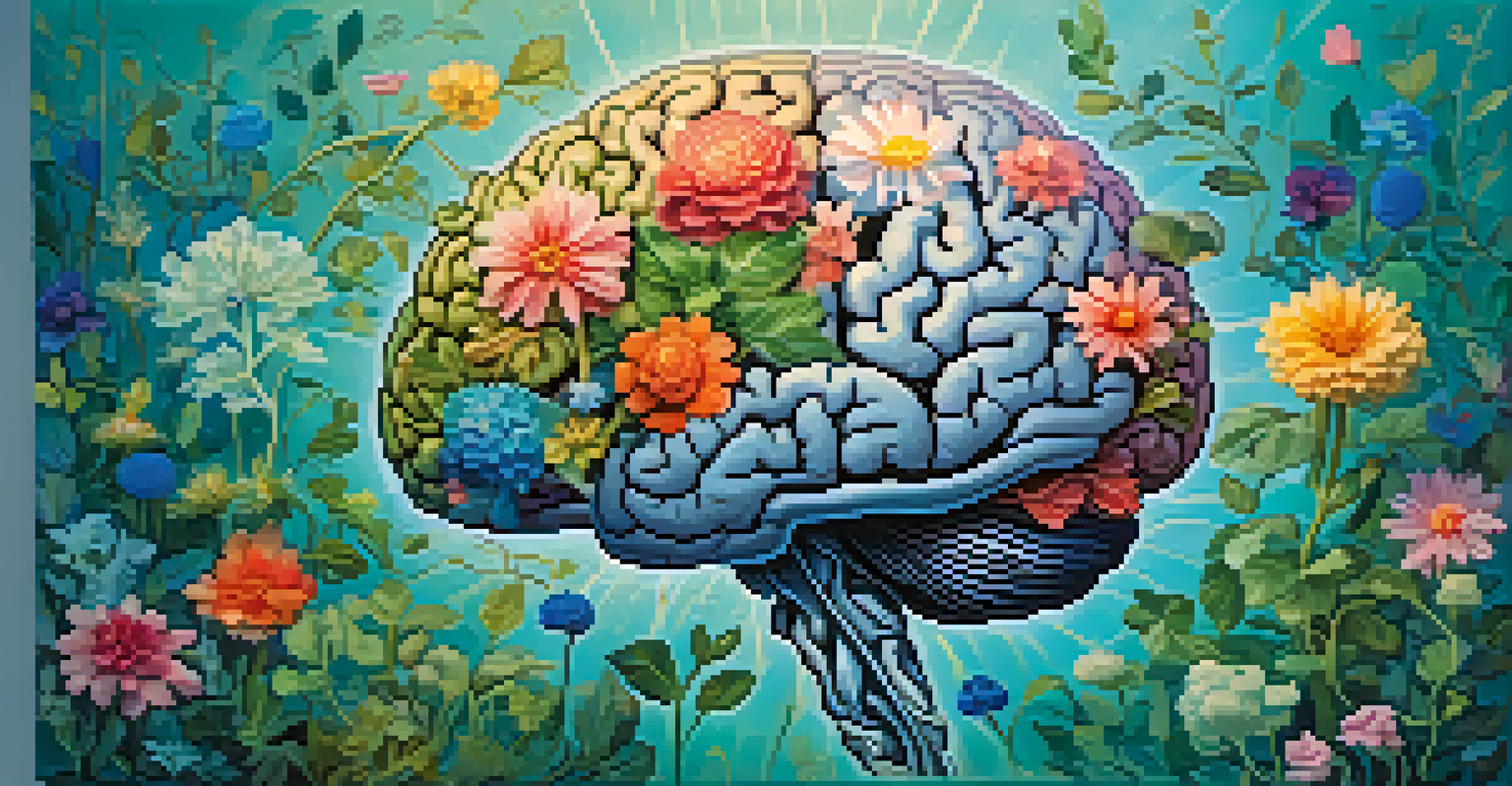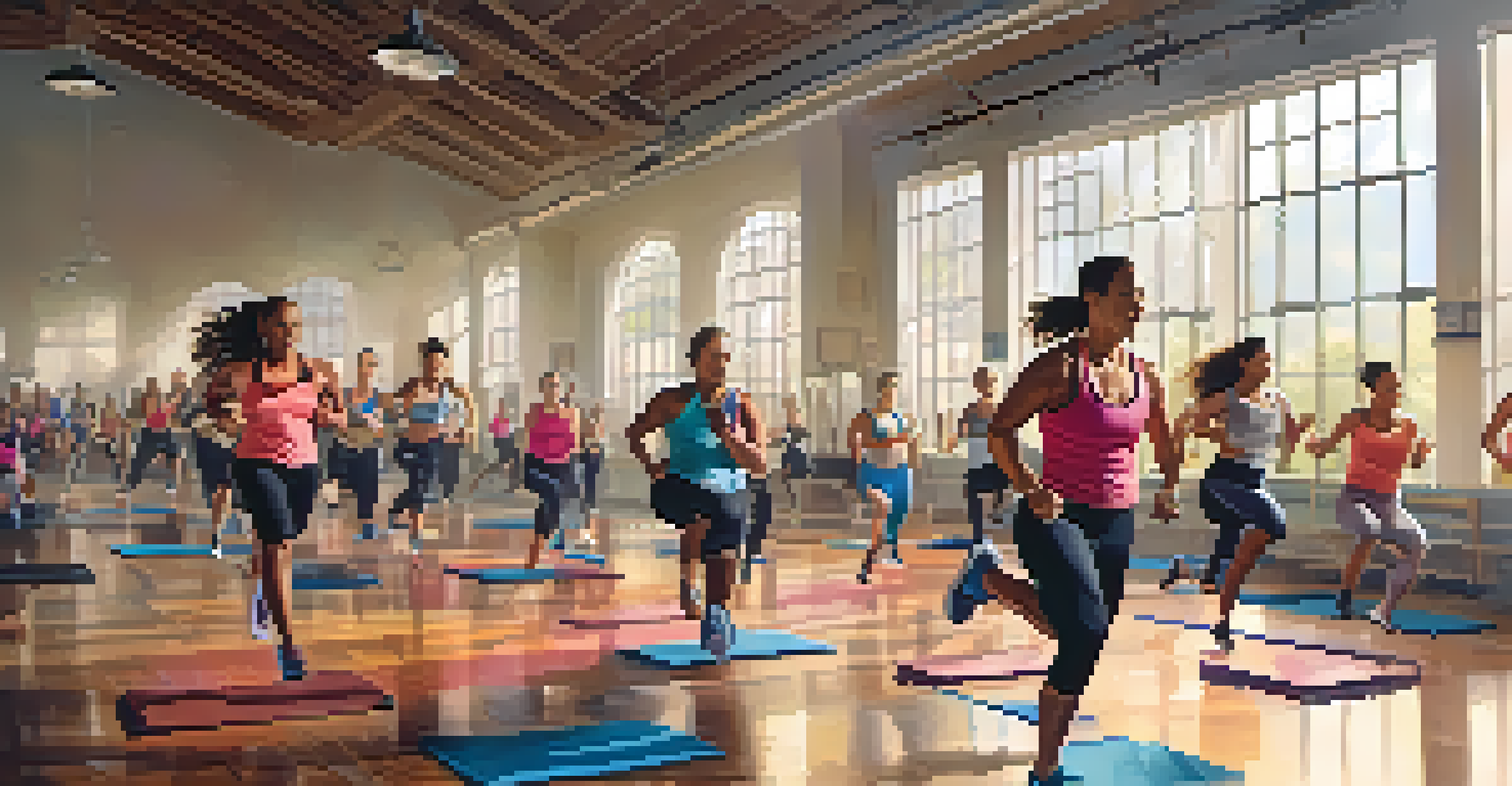The Relationship Between Physical Activity and Cognitive Skills

Understanding the Connection Between Movement and Mind
Physical activity is often associated with physical health, but its effects extend far beyond the body. Engaging in regular exercise can significantly influence cognitive skills, such as memory, attention, and problem-solving. This connection is rooted in the way exercise promotes blood flow to the brain, supplying it with vital nutrients and oxygen.
Physical activity is the key to health and happiness.
When you move, your heart pumps faster, and your body releases endorphins, which not only improve mood but also enhance mental clarity. Think of it like tuning a car; just as regular maintenance keeps a vehicle running smoothly, regular exercise fine-tunes our mental capabilities. Studies show that even short bursts of physical activity can lead to immediate improvements in cognitive performance.
This relationship between physical activity and cognitive function is not just theoretical. Numerous research studies have shown that individuals who engage in regular exercise often perform better in cognitive tests compared to their sedentary counterparts. It's clear that moving our bodies can lead to sharper, more agile minds.
The Science Behind Physical Activity and Brain Function
Research has demonstrated that physical activity triggers a cascade of biological processes in the brain. For instance, exercise increases the production of brain-derived neurotrophic factor (BDNF), a protein that supports neuron growth and survival. Higher levels of BDNF are associated with improved learning and memory.

Moreover, exercise has been shown to promote neurogenesis, the process of forming new neurons, particularly in the hippocampus, which is critical for memory formation. Imagine your brain as a garden; regular exercise helps it flourish by planting new seeds of knowledge and experiences.
Exercise Boosts Cognitive Skills
Engaging in regular physical activity significantly enhances cognitive functions like memory and problem-solving.
Additionally, engaging in activities that get your heart rate up can help reduce the risk of cognitive decline as we age. By maintaining a physically active lifestyle, we can not only enhance our current cognitive skills but also safeguard our brain health in the long run.
Types of Physical Activities That Boost Cognitive Skills
Not all physical activities yield the same cognitive benefits, so it's essential to choose the right types. Aerobic exercises, such as running, swimming, or cycling, are particularly effective at enhancing brain function. These activities increase heart rate and improve circulation, leading to better oxygen delivery to the brain.
Exercise is a celebration of what your body can do, not a punishment for what you ate.
Incorporating strength training can also be advantageous. Lifting weights or doing resistance exercises not only builds muscle but also has been linked to improved executive functions, such as decision-making and impulse control. Picture a well-rounded meal; just as a variety of nutrients is beneficial for your body, a mix of exercise types is vital for your mind.
Even activities like yoga and tai chi, which emphasize mindfulness and movement, can lead to improved cognitive flexibility and emotional regulation. This variety ensures that the brain is stimulated in different ways, promoting overall cognitive health.
The Role of Age in Exercise and Cognitive Function
Age can influence how physical activity impacts cognitive skills, with different benefits observed at various life stages. For children and adolescents, regular exercise is linked to improved academic performance and social skills. The schoolyard isn't just a playground; it's a training ground for future leaders and thinkers.
As we age, the benefits of physical activity continue to evolve. Older adults who remain physically active tend to experience a slower decline in cognitive abilities. Regular exercise can help maintain mental sharpness and reduce the risk of conditions like dementia, making it an invaluable aspect of healthy aging.
Age Matters in Exercise Benefits
The cognitive benefits of physical activity evolve with age, aiding children in learning and helping seniors maintain mental sharpness.
It's never too late to start! Whether you're a young adult looking to enhance your focus or a senior aiming to keep your mind sharp, incorporating physical activity into your routine can lead to significant cognitive improvements.
Mental Health: The Overlap with Cognitive Performance
Physical activity is not only a boon for cognitive skills but also plays a crucial role in mental health. Exercise has been shown to reduce symptoms of anxiety and depression, which can significantly impact cognitive function. When we feel good mentally, we're more likely to engage in tasks that require focus and critical thinking.
Engaging in regular physical activity can be a natural way to boost mood, thanks to the release of endorphins. Think of it as a mental reset button; after a good workout, many people find themselves feeling clearer and more capable of tackling challenges. This positive cycle reinforces the connection between a healthy body and a sharp mind.
Moreover, social activities that involve exercise, such as team sports or group classes, can provide additional mental health benefits through social interaction. This combination of physical movement and social engagement creates a powerful recipe for enhancing cognitive skills.
Creating a Balanced Routine for Optimal Cognitive Health
To maximize the cognitive benefits of physical activity, it's essential to create a balanced routine that includes a variety of exercises. Aim for at least 150 minutes of moderate aerobic activity each week, combined with strength training on two or more days. This holistic approach ensures that you’re challenging your body and mind in multiple ways.
Incorporating short bursts of activity throughout the day can also be effective. For example, consider taking brisk walks during breaks or opting for stairs instead of elevators. These small changes can add up, contributing to both physical and cognitive health over time.
Mental Health and Exercise Connection
Physical activity not only improves cognitive performance but also plays a crucial role in reducing anxiety and depression.
Lastly, be sure to listen to your body and adjust your routine as needed. Experimenting with different activities can keep things fresh and exciting while also allowing you to discover what works best for your cognitive needs.
Conclusion: The Lifelong Benefits of Staying Active
In conclusion, the relationship between physical activity and cognitive skills is profound and far-reaching. Regular exercise not only enhances brain function but also plays a vital role in mental health and overall well-being. By prioritizing physical activity, we can cultivate sharper minds and healthier lives.
It's important to remember that every small step counts. Whether you're just starting out or are a seasoned athlete, finding ways to incorporate movement into your daily routine can lead to lasting cognitive benefits. Think of it as building a snowball; the more you engage, the larger the benefits become.

So, lace up those sneakers, find an activity you enjoy, and start moving. Your brain—and your future self—will thank you for it!